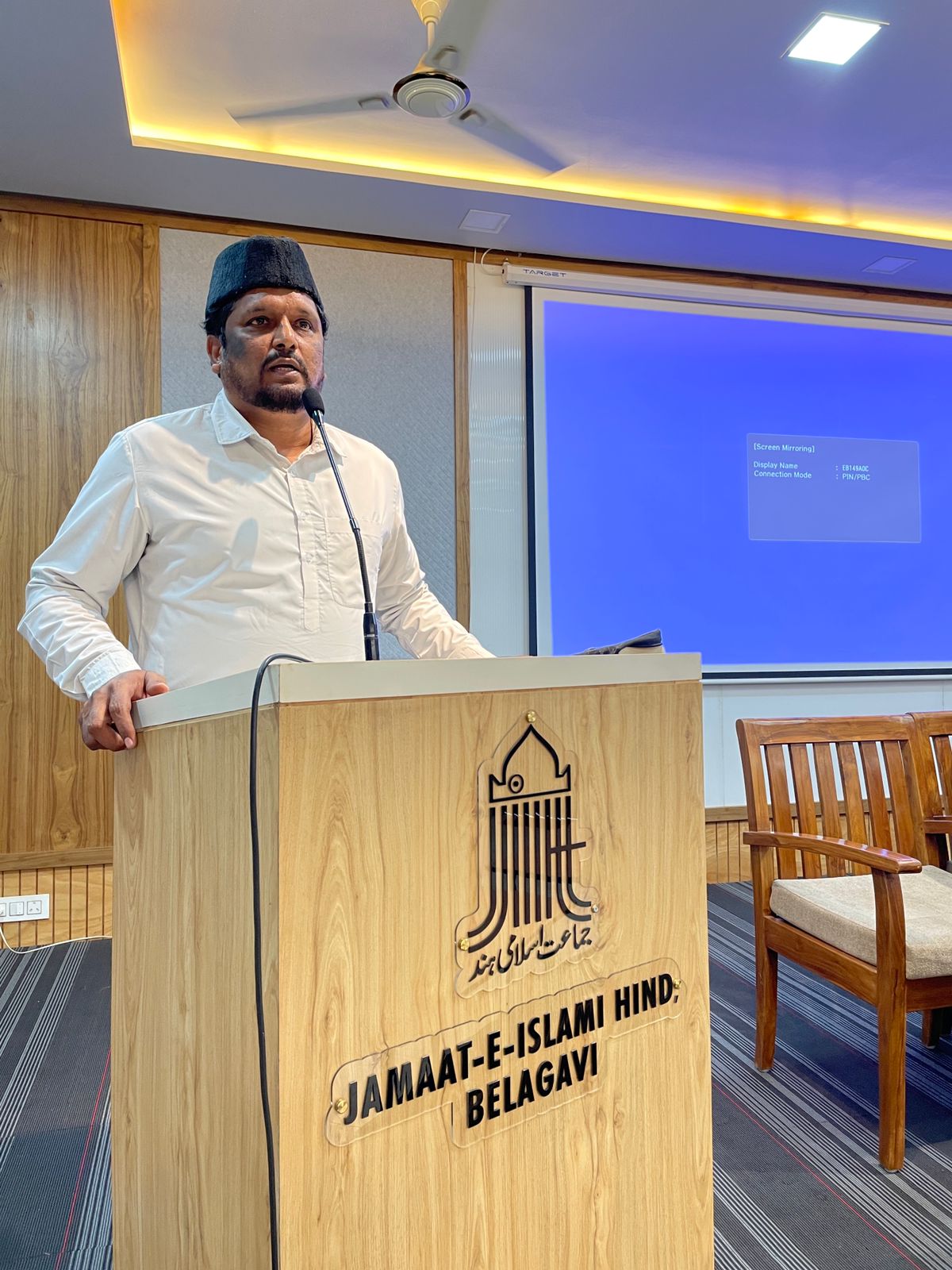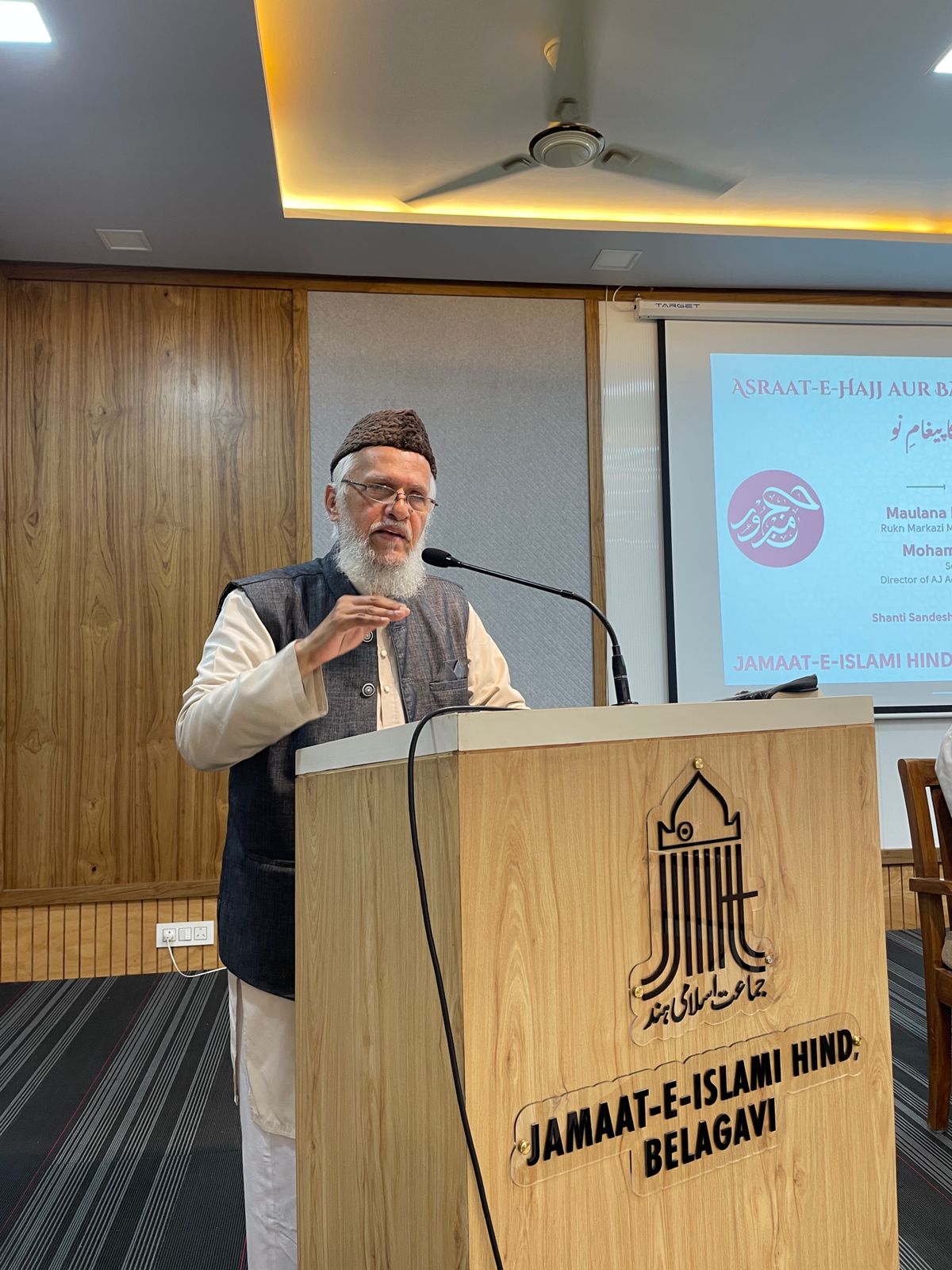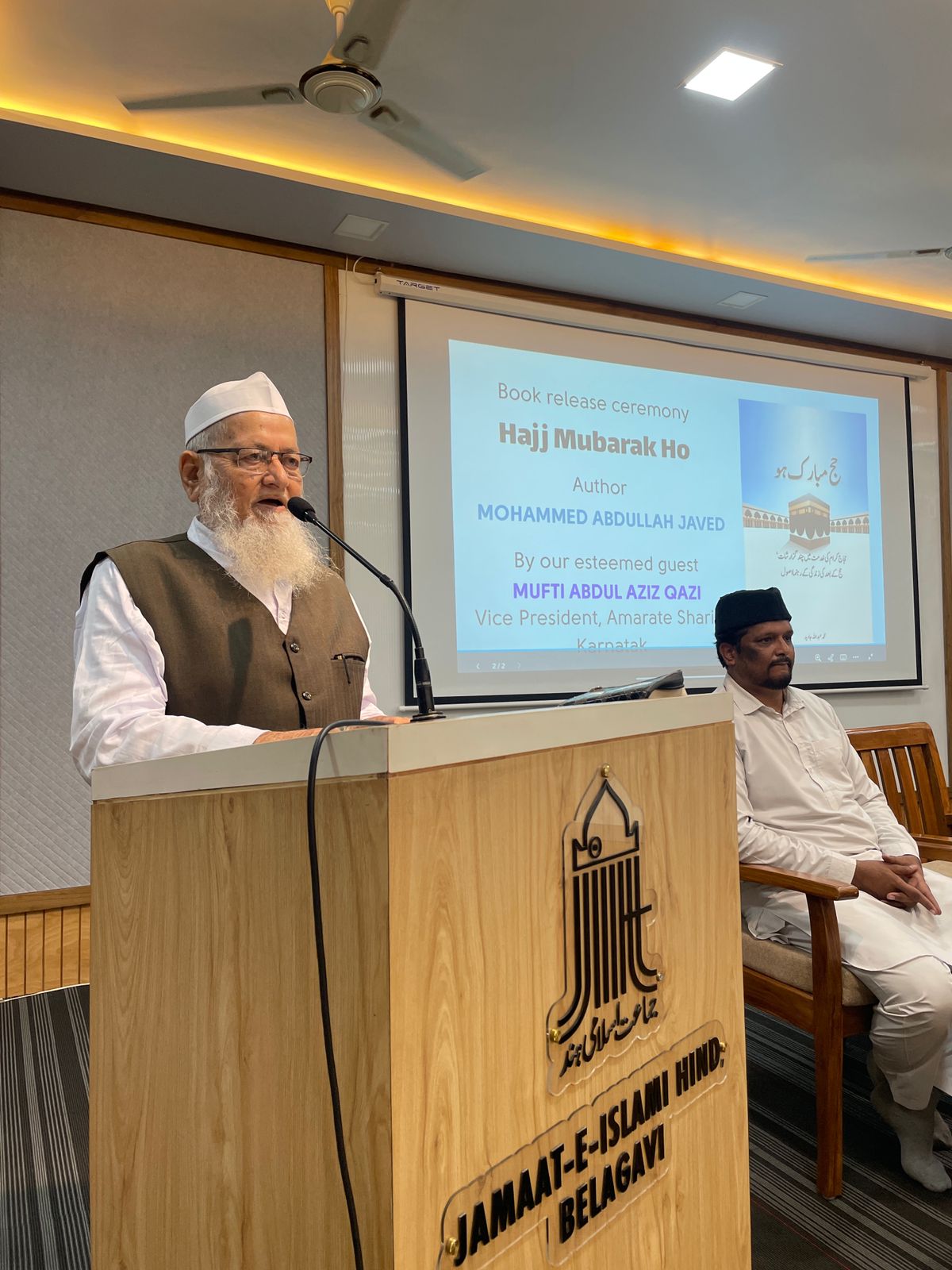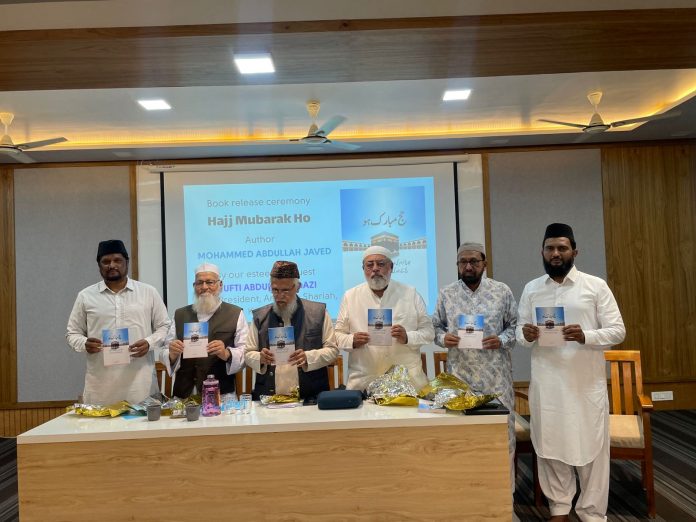– Mohammed Talha Siddi Bapa
Belgaum: In a heartfelt and spiritually charged evening, Jamaat-e-Islami Hind Belgaum hosted a warm reception for returning pilgrims under the theme “Effects of Hajj and the Message of Devotion” – not just to welcome them back, but to invite them and the community to reflect on how this once-in-a-lifetime spiritual journey could become a lifelong transformation.
The gathering wasn’t just ceremonial. It was deeply reflective. From the inaugural Qur’anic recitation by Maulana Mubeen Sahib to the inspiring words of leaders and pilgrims, the programme served as a bridge – connecting the sacred plains of Arafat and Mina with the very streets and homes of Belgaum.
A Journey Beyond Rituals
 In his keynote address, Mohammed Abdullah Javed, a noted thinker and guest of honour, beautifully captured the soul of Hajj. He reminded everyone that the essence of Islam – prayer, fasting, charity, and pilgrimage – is rooted in one single goal: to develop complete devotion and servitude to Allah. Using the metaphor of “Retreat Therapy,” he explained that just as one step away from the chaos of daily life to recalibrate the soul, Hajj offers immersive opportunity to purge the self of ego, vice, and distraction – and to rediscover spiritual discipline.
In his keynote address, Mohammed Abdullah Javed, a noted thinker and guest of honour, beautifully captured the soul of Hajj. He reminded everyone that the essence of Islam – prayer, fasting, charity, and pilgrimage – is rooted in one single goal: to develop complete devotion and servitude to Allah. Using the metaphor of “Retreat Therapy,” he explained that just as one step away from the chaos of daily life to recalibrate the soul, Hajj offers immersive opportunity to purge the self of ego, vice, and distraction – and to rediscover spiritual discipline.
But the call didn’t end there. The real test, he said, begins after the return. The rituals of Hajj – the circumambulation of the Kaaba, the running between Safa and Marwah, the chant of Labbayk – are not meant to remain in Makkah. They must echo in our lives through routine, repetition, and heartfelt consistency. “What you practised in Ihram,” he said, “must now be practised in your neighbourhood.”
Living the Legacy of Ibrahim (A.S.)
One of the most profound aspects of the programme was how speakers linked the ancient story of Prophet Ibrahim (A.S.), Hajar (A.S.), and Ismail (A.S.) to contemporary family life. Hajj, as was eloquently said, is not an individual affair. It’s a family mission, a collective sacrifice. The legacy of young Ismail’s obedience and Hajar’s perseverance reflects a home that nurtures divine love above worldly ambition.
Quoting the famous couplet, “Woh faizan-e-nazar tha ya maktab ki karamat / Sikhaye kisne Ismail ko aadaab-e-farzandi?”, speakers stressed how both spiritual influence and home education combine to create generations who live with purpose, sacrifice, and submission.
Spirituality Meets Social Responsibility
 Maulana Iqbal Mulla, senior leader and member of JIH’s Central Advisory Council, brought in a dimension often missed: Hajj is not just about absolution of sins but also about reclaiming a social conscience. “Yes, Hajj wipes away sins – but not the rights of fellow humans,” he emphasised. “One must reconcile with others, seek forgiveness, return what’s owed – especially to parents, spouses, neighbours, and even animals.”
Maulana Iqbal Mulla, senior leader and member of JIH’s Central Advisory Council, brought in a dimension often missed: Hajj is not just about absolution of sins but also about reclaiming a social conscience. “Yes, Hajj wipes away sins – but not the rights of fellow humans,” he emphasised. “One must reconcile with others, seek forgiveness, return what’s owed – especially to parents, spouses, neighbours, and even animals.”
He candidly addressed a critical perception: that Muslims are inward-looking, unconcerned with national issues. “This,” he said, “must change. If we carry the spirit of Ibrahim (A.S.), we must strive for peace, justice, and reform – not just within, but in our society.” True devotion, he reminded, is not isolation but active contribution to building a just and compassionate nation.
Books, Blessings, and Benedictions
 The event also witnessed the release of the book “Hajj Mubarak Ho,” launched by Mufti Abdul Aziz Sahib, Vice Ameer-e-Shariat, Karnataka. Calling it a “comprehensive guide and a post-Hajj companion,” he urged pilgrims and attendees alike to build a habit of reading and self-reflection.
The event also witnessed the release of the book “Hajj Mubarak Ho,” launched by Mufti Abdul Aziz Sahib, Vice Ameer-e-Shariat, Karnataka. Calling it a “comprehensive guide and a post-Hajj companion,” he urged pilgrims and attendees alike to build a habit of reading and self-reflection.
In his remarks, Mufti Sahib reiterated the transformative potential of the Hajj journey – urging everyone not to let this spiritual high fade into memory but to institutionalise it in family values, community ethics, and public behaviour. His concluding dua moved the entire gathering, binding hearts in a shared prayer for peace, prosperity, and purpose.
From the Ka’aba to the Kitchen Table
The most powerful take-away from the evening was that Hajj does not end with the flight back home. It begins again in new ways – in how we forgive each other, how we speak to our children, how we engage with society, how we seek justice, and how we centre our lives around the love of Allah.
If the plains of Arafat taught submission, our neighbourhoods must echo that humility. If the stoning at Jamarat taught resistance to evil, our streets must see us resist injustice. If Ihram taught equality, our homes must breathe that spirit of simplicity and solidarity.
In Belgaum, the reception wasn’t just for the pilgrims – it was an invitation for the entire community to take the journey inward. To bring Mina into our mohallas. To turn the lessons of Hajj into a living legacy.
Because a city that welcomes its Hajis with purpose, may one day rise to walk together – as a people of peace, purpose, and prayer.




